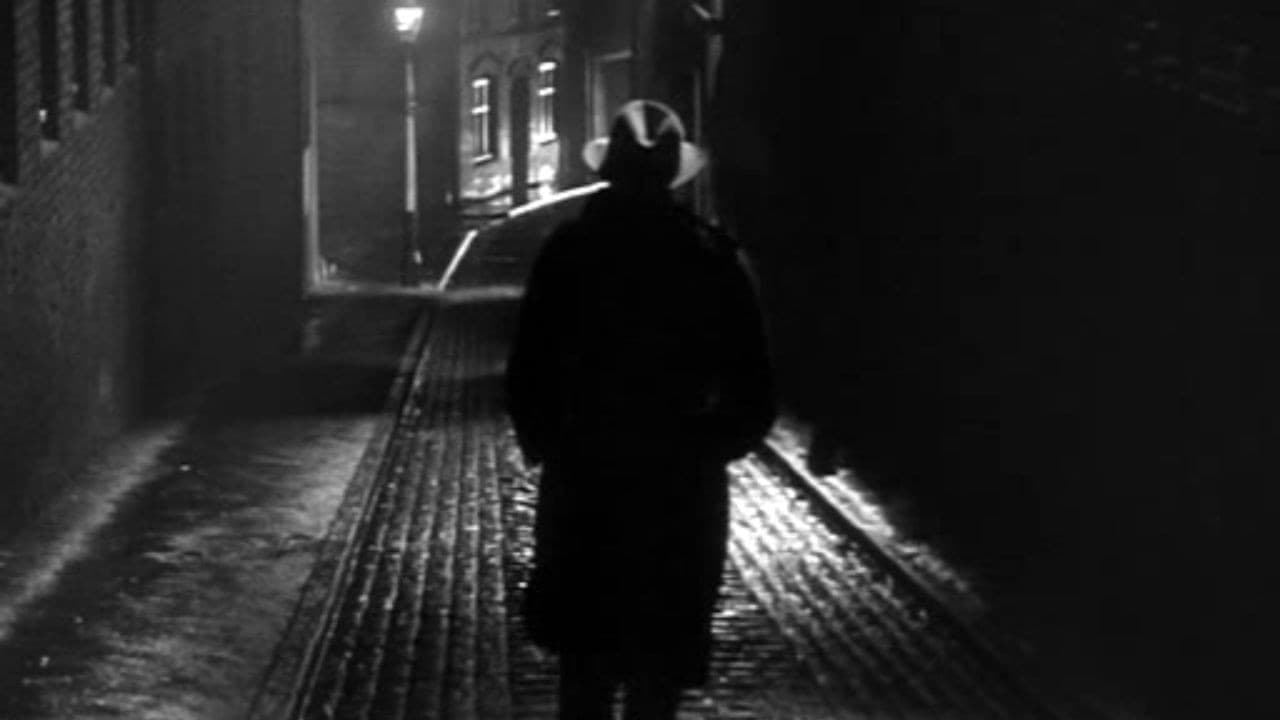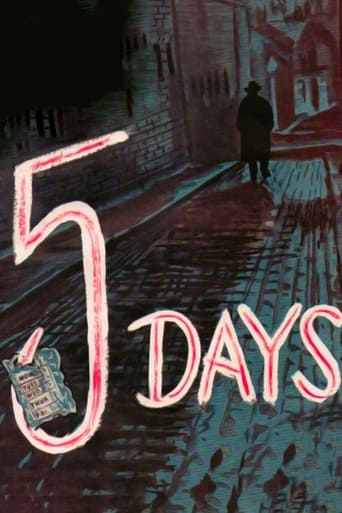

Irony meets Film Noir in this study of an anxious C.E.O. who, believing he is on the verge of financial ruin, plots his own murder so his philandering wife will get the insurance money. But as fate has it, his fortunes turn, and he must stop the hit-man he hired to kill him before it is too late. "One way or another, I'm gonna get ya!" could be the theme song of one sequence where the killer goes after him in a variety of ways, and after these several attempts fail, he learns the truth.An above average entry in this series of Hammer Film Noirs (many of them less than mediocre), it is a variation of the old "D.O.A. plot where the victim tries to solve his own (possible) demise. A faithful secretary is his only confidante, and there's always a doubt as to who the real culprit is. Dane Clark may seem an odd choice to play a corporate executive (especially one in England), but he's actually quite good. There's a very funny sequence involving a rare Aztec vase being protected by a nervous assistant to the over-the-top Sydney Greenstreet like archaeologist whose denouncement at the very beginning of the film sets Clark's plans into motion.
... View MoreThis is by no means a great film. It however still holds interest for the politics of the film. The producer, Libert had an agreement with Hammer film studios that he would provide known American actors in British films. Forced into this situation, came this interesting film. Like the Quatermass films with Brian Donlevy, we are shown two men, who are not identified as I remember as Americans, but we can tell are (though Paul Carpenter was born in Canada) One is at the top of the social ladder, and one more so at the bottom. They are supposedly friends, having that "American" bond. When Paul Carpenter arrives at Dane Clarks home, a party is going on. Though Clark is not their. People are elegantly dressed, but Paul comes very casual to say the least, which really sets him apart from the other people at the party, apparently all British. One of the guests at the party is one of the people who works at Clarkes company, being in the boardroom, who is earlier accused by a colleague of only having this job because of family connections. Clark on the other hand arrives at this party late, possibly from working late. While he is dressed in a tie, he does not go into the milieu of the party, but views his wife from an opening in a wall. As we can see, he is somewhat the chairman of a board, and believes that he has gotten into a business deal that will ruin his company, and his reputation. He has the intent of hiring Paul Carpenter, as Paul to kill him, so that his wife, who he loves deeply can collect the insurance. Later of course, Clarke's character will realize that the deal that he failed would fail, has gone through, and will make the company a fortune. The plot of this somewhat implausible story is now for Clark to save his own life. The interesting thing about the film are the relationships. While Clark loves his wife deeply, I somewhat suspected that she did not return this in kind, and of course this would be revealed in the end, and that she does not love Dane Clarks character, a man we can see somewhat had to fight his way to the top, but the Englishman played by Anthony Forwood, a man born into money. She blames Clark for marrying her for her wealth, and says she despises him.Here is Clarks character, an American head of a British Company, who is often separate from the rest of his people on the board, who is delusional that his British wife loves him, and believe that he has a British friend, who is actually trying to kill him. On the board he has a member who is antagonistic to him, and does not like the methods of which Dane Clarks character will try to get results, considering them underhanded and dangerous. While he is fat and old, while Clark is young and slim, he seems to take the case of defending British honor against Clark, which will culminate in a Turkish bathhouse scene, which has somewhat homosexual overtones, where the Englishman will express his dislike for Clark, to Clarks humiliation. Clarks relationship with his secretary however is totally different. She is devoted to him, so much so that when he yells at her, one almost feels a sado-masochistic relationship, that he could probably take somewhere and beat her, and she would feel it is showing her devotion to him. Mirroring this is a devotion from a barmaid to Paul Carpenters character, (a caricature of the Ugly American?)a misguided love, though not in the same vane as Clarks relationship with his secretary. Throughout the film, we are shown a disdain of some of the characters for Americana, and also from others a reverence. One writer here reviewing the film has suggested that with the demise of Clarke's scheming wife, that he will have free reign with his secretary. While she has stated her love for him while he tried to strangle the true love of his wife. It is interesting the last scene, when he carries his wife's dead body from the garden house to the home. He feels that is where her body belongs, and one still sees, though he should really feel disdain, a misguided love for this dead woman. The secretary who loves him, and has saved him from death, seems to follow him dejectedly into the house. Does the American Clark, really love his dead wife for what she represents, some idea of British wealth. It could be argued that he will really not fall in love with his secretary, as she is in the lower status of the British social order.
... View MoreTaking advantage of arrangements favoured by the UK's Eady levy (a state film subsidy established after the war) in 1950, American producer Robert Lippert formed a business alliance with Hammer studios. Under the agreement, Lippert would provide American acting talent - frequently shop-worn stars or just supporting actors who fancied a profitable trip out of the country - while Hammer would supply the rest of the cast and the production facilities. Together they would split the profits. Famous for his concern with the bottom line, Lippert produced over 140 films between 1946 and 1955, characteristically genre pieces such as I Shot Jesse James or Rocketship XM. For the British deal, most of the films were noir-ish thrillers -including 5 DAYS/ PAID TO KILL.Dane Clark appeared several times under the production arrangement, but makes one of his most successful entries here as a man in a jam, with a plan, and a dame. Possessing a characteristic persecuted look, Clark is eminently suited to the role of businessman James Nevill who - fearing that a big deal has gone sour - pays a friend to kill him, to secure insurance money for his unsuspecting wife. Nevill abruptly needs to change his murderous instructions when matters change for the better, but cannot find his unreliable friend. He finds the repeated attempts on his life - whoever it is making them - too close for comfort. Says a business acquaintance of Nevill's business style that: "it's okay for cutthroat and adventure - but not for the City of London." Such a contrast exists elsewhere in a film containing one or two jarring, humorous scenes, featuring Charles Hawtrey (a non-speaking part) partnering Nevill's troublesome, truculent investor. Away from these distractions the film is much stronger, notably in the understated love for Nevill shown by his secretary Joan (Cecile Chavreau), which is played subtly. Although for many the film's final twist is telegraphed someway in advance, 5 Days/Paid To Kill is reasonably suspenseful and largely successful on its own terms, efficiently directed by Tully.
... View MoreI'd always been interested in catching some of the films from Hammer's pre-horror boom; so far, the only title I'd come across was PHANTOM SHIP (1935) which was made a couple of decades before the studio reached its peak period but which, presciently, starred one of the era's horror icons Bela Lugosi.Anyway, Hammer apparently made a whole slew of ultra low-budget noirs featuring either faded American stars or second-tier leading men. This one, then, happened to be shown on late-night Italian TV and, knowing it's been released on DVD by VCI, I made it a point to check it out. It turned out to be a decidedly modest but not unpleasing little film: the star in this case is Dane Clark (not exactly top rank, you see) and, as I lay watching, felt that he wasn't really noir material an opinion which, incidentally, I would change the very next day when I saw this same actor in the superior French-made GUNMAN IN THE STREETS (1950)! The plot, though far-fetched, is engaging: Clark's business fails and, in order to provide for his wife, proposes to have himself killed so that she can collect on his insurance; soon after, his fortune unexpectedly turns and he desperately seeks to stop his killer from carrying out the assigned task! Even if I watched the film dubbed in Italian, the London settings and character types offer a whole different atmosphere to the American noirs the same thing goes for the French locations of GUNMAN IN THE STREETS and this does help keep one's mind off the measly production values. The denouement provides a few surprises Clark's wife emerges a villainess (which allows him free rein with the devoted secretary who had really loved him all along), the attempts on his life turn out not to have been done by the person he paid expressly for that purpose which elevates the whole slightly than would otherwise have been the case. Besides, the film is short enough at 75 minutes not to overstay its welcome or allow the proceedings to slip into tedium. By the way, the original British title of this one is FIVE DAYS (the period of time over which events take place) but got changed to the more evocative PAID TO KILL for the U.S.
... View More